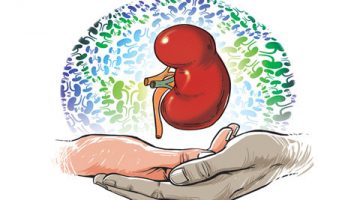- Home
- Editorial
- News
- Practice Guidelines
- Anesthesiology Guidelines
- Cancer Guidelines
- Cardiac Sciences Guidelines
- Critical Care Guidelines
- Dentistry Guidelines
- Dermatology Guidelines
- Diabetes and Endo Guidelines
- Diagnostics Guidelines
- ENT Guidelines
- Featured Practice Guidelines
- Gastroenterology Guidelines
- Geriatrics Guidelines
- Medicine Guidelines
- Nephrology Guidelines
- Neurosciences Guidelines
- Obs and Gynae Guidelines
- Ophthalmology Guidelines
- Orthopaedics Guidelines
- Paediatrics Guidelines
- Psychiatry Guidelines
- Pulmonology Guidelines
- Radiology Guidelines
- Surgery Guidelines
- Urology Guidelines
An 84-year-old man donates kidney, becomes oldest living kidney donor in the United States

An 84-year-old Texas man recently became the oldest living kidney donor in the country after donating one of his kidneys to his 72-year old neighbour at Houston Methodist Hospital.
Earlier in May 2012 an 83-year-old man had become the oldest person in the UK to donate a kidney while still being alive.
Frank Dewhurst, who lives six houses down from Linda Nall, had known for years that his neighbour’s kidneys were failing, but it wasn’t until he saw a sign in her front yard that he decided to take action.
“The sign read ‘I am type O and I need a kidney transplant. Please help me.’ So after talking it over with my wife, I told her she could have mine,” Dewhurst said. “After undergoing a number of tests I was cleared to donate and very happy to do so.”
Nall said because Frank was the past president of Homeowner’s Association and is still very actively involved, she thought he knocked on the door to tell her to take down the sign. Dewhurst, who retired from IBM after 30 years, said he watched his neighbor struggle to even get out of her car.
“When he told me he wanted to give me his kidney, I was shocked. It’s an incredible thing he has done for me and I am so grateful,” Nall said. Dewhurst left the hospital within 48 hours after surgery and is already back to exercising and resuming normal activities.
More than 100,000 people are waiting for kidneys and only one out of three of these patients are transplanted within three years. Nearly 5 percent of these people die every year waiting. Transplant through living donation can be done in three to four months and can either prevent the need for dialysis or shorten the time spent on such a cumbersome therapy.
“On average, over 60 per cent of kidneys from living donors last greater than 10 years in comparison to 46 percent from deceased donors,” said Hassan Ibrahim, M.D., chief of kidney diseases at Houston Methodist Hospital. “This is why we encourage patients to find a living donor whose odds of never having kidney problems after transplant exceed 99 per cent.”
There is a common misconception that older people cannot be donors because of their age. Ibrahim said that is not true, and, in fact, more than 200 people over age 70 have become living donors in the United States since 1995.
“Besides Mr. Dewhurst, we have taken kidneys from an 80-year old, a 79-year old and other donors in their late 60s and early 70s,” Ibrahim said. “They receive a full workup to make sure they are physically strong enough to donate. If everything checks out, there is no reason to keep them from saving someone’s life. In 2018, 5 percent of kidney donors nationally were older than 65. If more older adults donated, fewer people would remain on the list.”
The best use of these older kidneys is to transplant them into older patients. Ibrahim says if you transplanted an 80-year old kidney into a 20-year old and that person lived to age 60, the kidney would be 140-years old. However, he said, for someone like Linda Nall, who could have spent years on the waiting list, it is perfect.
In 1986, Nall was diagnosed with lupus, an autoimmune disease that can attack healthy organs. In 2001 the disease attacked her kidneys and she was put on a strict diet for years and eventually went on dialysis for a brief period before Dewhurst stepped in.
“I can’t wait to spend more time with family and friends and just socialize more,” Nall said. “I have lived a long time not being able to eat what I want to eat and do what I want to do. I am going to make the most of Frank’s generous gift and live life to the fullest. I cannot wait.”

Disclaimer: This site is primarily intended for healthcare professionals. Any content/information on this website does not replace the advice of medical and/or health professionals and should not be construed as medical/diagnostic advice/endorsement or prescription. Use of this site is subject to our terms of use, privacy policy, advertisement policy. © 2020 Minerva Medical Treatment Pvt Ltd